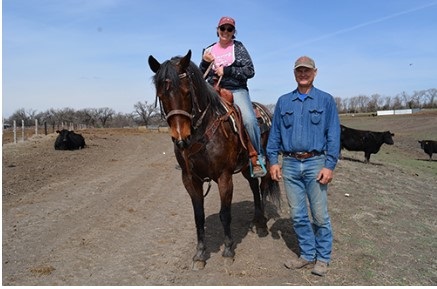BILLINGS, MT – Stockmen throughout much of the West are dealing a “grand slam” of tough events—severe drought, grasshoppers, fire and extreme heat. Trying to keep cattle healthy and well fed when there isn’t much hay or grass around, as well as keeping your business afloat, has called for hard decisions and creativity.

The Montana Farm Bureau Federation has put together a resource page on their website where producers can find links for help. This includes everything from the Montana Department of Agriculture’s Hay Hotline to the Managing Drought Risks on the Ranch Guide through MSU Extension. Visit www.mfbf.org for drought resources.
According to Cory Parsons, CHS nutritionist, who spoke to Park County Farm Bureau during their drought summit, the key is to put pencil to paper and figure out the nutrient requirements of your cows.
“Remember, there are different nutrient requirements for different cattle at each stage of their lives,” Parsons said. “See what you can do to both balance your checkbook and then see what you have to pull together with grains, hay and other commodities. Be sure to do a feed analysis and see how much protein your cows need.”
Parsons explained that often ranchers will feed dry distiller grains, beet pulp and barley sprouts to supplement protein intake, but this year, even those supplemental feed stuffs aren’t readily available. The other challenge is the labor and equipment needed to make feed changes. If you’re not set up with a cake feeder to feed cake and store cake, you need to get creative. Do you have the labor to do it?
“The ethanol plants aren’t running like they were, people aren’t drinking as much beer so there is less barley in production, and when feedstuff like beet pulp or DDGs are available, they are expensive and everyone is in competition for them,” Parsons cautioned. “I’ve seen some wheat fields in windrows, waiting to be baled. A lot of people are going to be culling at least some of their animals. It’s important to pregnancy test early, then get the open cows shipped down the road quickly. I reiterate, when you buy protein, buy it on a unit basis. Run a cost of feed analysis.”
MSU Extension researchers have written articles, given drought tours, and posted booklets on dealing with the drought. Dr. Megan Van Emon, USDA-ARS, Fort Keogh, echoed Parsons regarding feed alternatives.
“It’s critical to get a feed analysis, as some feeds are highly variable in nutrient content. Currently, there are non-traditional feedstuffs being fed such as wheat midds and straw, as well as grazing cereal grains,” said Van Emon. However, one needs to use caution. “Corn, barley and wheat are highly digestible in the rumen and could potentially lead to acidosis or bloat if fed at too high level in the diet too quickly. Adapt cattle to grains over a period of time to allow the rumen to adapt to the new feedstuff.”
“If feeding or grazing cereal grains or weeds, get nitrate tests done,” Van Emon said. “Many weeds, like kochia, and cereal grains accumulate nitrates and are especially high this year due to drought. Most local Extension Agents have the ability to test for nitrates using the Nitrate Strip Test, which is a quantitative measurement, meaning that an approximate concentration of nitrates in the sample can be provided.”
“We have been asked about feeding cattails, which are very thick stemmed and not eaten well. They should be ground and mixed with other hay to improve intake of them, but remember, they have little nutrient content,” Van Emon added. Although there is talk about feeding hemp, it has not been approved as a cattle feed and should not be fed.
She urged ranchers to discuss feeding options with Extension agents or beef cattle nutritionists to make sure they’re meeting nutrient demands of the herd.












